He is a quantitative economist, with a doctoral degree from the University of Georgia and a post-doctoral degree from Harvard University. He has worked for Fortune 10 companies and has a slew of internationally published research papers to his credit. Yet, it is the concert stage he frequents, not the board room — for he has given up his undoubtedly lucrative career for his true calling, Carnatic music. His voice is resonant, and his music distinctive — emotive, yet intelligent. He has a strong propensity for ‘praacheena’ music and a principled, no-nonsense outlook — in fact, they are the cornerstones of his musical value system. Put that together with innate brilliance and you get a musician par excellence — meet Palghat Dr R. Ramprasad, vocalist and grandson of the legendary mridangam maestro Palghat Mani Iyer.
What are your earliest memories relating to music?
Recalling when I started singing is like recalling when I started speaking — I began singing that young, so I don’t have exact memories. Music has always been a part of my life.
I did not have formal or systematic training starting with the varisais, exercises, etc. My father started teaching me keertanais; my first songs were Srirama Srirama, the utsava sampradaya keertanai in Sahana, and Sri Guruguha in Shuddha Saveri. I have listened to tape recordings of me singing these songs as a two year old.
Tell us about your experience being your father’s disciple, your growing-up years in a music-rich household, your grandfather’s influence on your music (even though you probably don’t have memories of him?).
To me music was — and still is, to a large extent — synonymous with Appa and Mani thatha. While kids are told stories from the epics and puranas, my father told me stories of Thatha’s early years and his concert experiences in a way that a child would understand, yet ensuring that the message from each of those incidents was conveyed. That way, I was doubly blessed to have a father who also happened to be my guru.
He was an extremely strict disciplinarian as far as my music was concerned. He was so ‘generous’ with his punishments that watching my classes was entertainment for my friends! Invariably, every class would entail beating, kicking and throwing whatever he had in his hands if I did not deliver what he expected.
In our household, all conversations had references to music directly or indirectly. For instance, if a fan was rotating too slowly, there would be a reference to MDR’s music. If the rasam didn’t taste as usual, it would be compared to the raga I sang that day (laughs)!
Many musicians used to come home and Appa would also take me frequently to the houses of Semmangudi mama, KVN mama, Palghat Raghu mama, Sivaraman mama, Lalgudi mama, TNK mama (when he visited Madras from Delhi), et al. Since I was blessed to have shared the stage with doyens such as T.K. Murthy mama, Palghat Raghu mama, TVG mama, UKS mama, Trichy Shankaran mama and Ramabadran mama when I was in my early teens (in the early 90s), Appa used to take me to visit these doyens even for finetuning my concert presentation skills. I have several memories of these stalwarts sharing their experiences during their conversations with Appa. I understood some of them; Appa would explain the rest on our ride back home in the Lambretta scooter we had then.
We would also visit Lalitha (Sivakumar) athai’s house often, and when I played with Nithya (Nithyasree Mahadevan), all my games would have references to music. My sister Sukanya (who sang along with me for many years until she could no longer cope with male sruti) and Nithya used to team up and rag me to the point that I have cried plenty of times! Many times, Sowmya used to be in Nithya’s house too — but my memories of spending time with them are not music related.
I don’t remember my parents ever asking me about my scores in school exams or even which grade I was in. After my concerts, people would ask my father, ‘What does your son study,’ and my father would duly delegate it to me saying, ‘See, mama is asking which grade you are in — tell him properly,’ since he would not know the answer himself!
I remember waking up early, 4.30–5.00 am, and practising (very reluctantly, and only out of fear of my dad) until I left for school around 8 am. I would come back from school and practise for an hour before play (sometimes even that would take a hit), come back after play and practise again. Coming to think of it, 4–5 hours of practice a day was common on school days, and much more during holidays.
Was music not your obvious choice of career, especially since your debut was very successful (first concert for YACM at 7.5 years, you won ‘Best Artist’ award for that concert, and you were accompanied by stalwarts even as a teenager)?
Music was not an obvious career choice for a few reasons.
Yes, my debut concert was in 1988 at YACM (where, incidentally, I later served as the secretary and president) with Shri S. Varadharajan on the violin and one Shri Raja (who does not seem to be in the circuit now) on the mridangam. And by the early to mid-90s, since I was fortunate to have been accompanied by stalwarts, I started performing quite frequently (by the standards of those days). Given that there were neither as many musicians nor as much media coverage as today, I was lucky to have had good visibility in the field then.
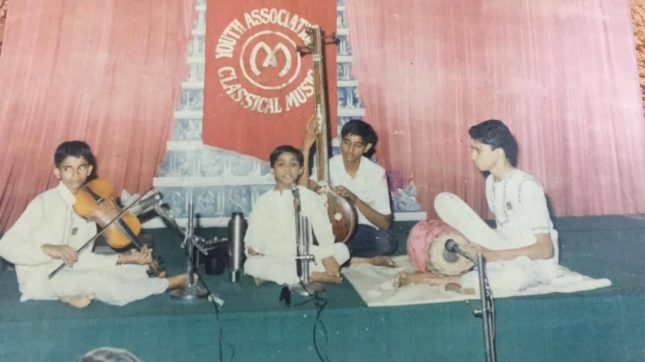
Palghat Ramprasad at his debut concert at YACM (15th August 1988) with Shri S. Varadharajan on the violin and Shri Raja on the mridangam
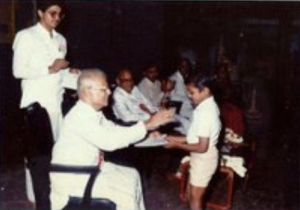
Palghat Ramprasad receiving the Best Artist award from his idol Shri K.V. Narayanaswamy for his YACM concert
However, the time that I was establishing myself — in the late 90s and early 2000s — was when the unabashed use of marketing, PR and such strategies in the field came out in the open. Given my family background, my father did not believe even remotely in taking that route, and recalled my thatha saying, ‘Talent is like sunlight. If it is that great no one can restrict it coming out’. Well, at least we realised that I was not as talented as my thatha meant in that context (laughs)! In addition, I was picky in my choice of co-artists, time slot and so on, which made it logistically harder for the organisers to finalise my concert, and that hurt my career progression. Essentially, there were no compromises on or off stage — which is still the case. Consequently, my family and I felt that I may not get the opportunities I deserved or due recognition, which made me question the feasibility of choosing music as a profession. Moreover, financial lucrativeness in this field was at a nascent stage then. All this made me choose a different direction, so I went to the US in 2004 for my PhD in economics and later my post-doctorate at Harvard, followed by an academic and corporate career in the US until I came back to India a few years ago. It was only in the last year that I quit my job and took to music full time.
It can’t have been easy straddling two entirely different worlds – work/academics and music, that too when you were abroad. How did you manage to devote time to music while abroad?
Definitely not, it was not easy. During my PhD days in the US, my music performances took a hit. On average, I used to perform only a concert a month or even less, somewhere in the US, with local co-artists. It was not easy to handle that situation emotionally, but I would tell myself that it was only temporary and at the end of it nobody could take my PhD from me! That said, music was always a constant — through my teaching. I taught 7–8 students, so that kept my learning curve alive even during my PhD days. Not to mention the infrequent classes I had with Appa — either remotely or while he was in US. Irrespective of all of this, I ensured that I practised regularly, because music had been a part of me since infancy and nothing — by God’s grace — could do us apart.
After a few years of working in the academia in the US, I relocated to India but the jobs that I took up here entailed lot of travel abroad. Hence, I would schedule my classes such that I would teach from the hotel in which I was put up, and I would practise when I was home. In 2016, I started transitioning into consulting roles that gave me greater flexibility with my work and hence left me with more time for music practice. It was in 2018 that I was convinced I would only spend my time on my passion and what I like the most.
Your grandfather said that niraval singing is the test of a ‘true vocalist’, is that right? How does a vocalist pass that test?
As all musicians in the field know — or are expected to know — niraval explicitly combines aspect of talam or layam, akshara suddham, bhavam and creativity, while other manodharma aspects cover only one or some of them. Hence, the test of a vocalist lies in being able to handle niraval easily. Inferentially, one could say that an artist who handles niraval with ease is likely to be comfortable with other aspects of manodharma as well.
I recall an incident that my father told me about Mani thatha and Alathur Srinivasa Iyer judging an RTP competition in the mid-60s at a reputed sabha in Madras. The participants, as expected, came prepared with complex pallavi lines in difficult-to-handle talams. My thatha consistently kept asking the participants to sing 3–4 continuous avartanams of niravals in simple Adi talam in any song of their choice before exhibiting their vidwat in the complex pallavi! His standpoint was that the pallavi in an RTP was nothing but niraval, and if an artist was unable to sing niraval in a simple verse without repetition in ideas or creativity, then what was the point in presenting a difficult pallavi, when it can only mean that the pallavi was rehearsed and not truly manodharma! His contention was that such complexities should be predominantly used as practice methods to enhance one’s vidwat, and presented on a concert platform only when it has been practised enough to be delivered with such ease that the audience is not even aware of the complexity, and is able to enjoy it as comfortably as any other simple niraval!
I ensure that I incorporate niraval singing as one of the components of my everyday practice routine, in addition to voice culture (akaram) and learning keertanais.
Why not the violin (like your father) or the mridangam (like your grandfather)?
I practise both at home, though I know neither properly. Who knows? Someday I might sit on the stage as a violinist accompanying a vocalist.
I have read that you are studying the effects of traditional practice methods on brain activity, is that right? You are also doing research on the use of traditional methods as a curative process for professional singers with vocal defects. Can you tell me more — what kind of vocal defects? What have you found from your research?
I did not make much progress on the brain activity research, and as of now am focusing on understanding if traditional practice methods can be used curatively rather than just preventively for vocalists. I am still only at the stage of designing the experiment, hence results are still quite a way off now. I have had first-hand information about traditional practice methods which were passed on from generation to generation, from Shri KVN mama as advocated by Iyengarval (Ariyakudi Ramanuja Iyengar), besides my father’s inputs on how various schools of music apply vocal techniques as recounted by my thatha. I have also had many discussions with musicologists and artists from prior generations on traditional methods of practice. Using this information in my research, I want to understand if such methods can help vocalists to overcome or cope with voice issues such as vocal cord polyps, nodules and so on. Some of my disciples are clinical voice therapists, and I have been working with them closely to get this research rolling. Soon I will look for a formal/institutional association to undertake the experiment. Eventually, I would like to set up a facility where performing vocalists can benefit by enhancing their vocal capabilities physiologically through traditional practice methods rather than by medical intervention.
Other than being an independent consulting economist, is your focus entirely on Carnatic music? I assume that was a tough decision to make, both financially and from the standpoint that you aren’t making full use of your educational qualifications.
As I mentioned earlier, I started to phase out my corporate career beginning 2016−17. It was not an easy decision, obviously, given that I have a family. My idea was to ensure that I earn through music what I needed to run the family comfortably with no compromises, rather than comparing it to what I would earn in the corporate sector. In that sense, the transition was smooth. Fortunately, neither me nor my wife have been particular about money. Honestly, she has been very understanding of the career choices I have made. Several times, I have chosen jobs that would give me work–music flexibility over others that would pay me 3−4 times as much. Consequently, I have worked for Fortune 10 companies as well as unknown start-ups.
Also, I was convinced that if I took such a bold step — quitting a job for music, with sincere intentions and the willingness to work very hard — God would not leave me stranded. I had the faith that there would be a reward for the sincerity and truth in my pursuit. Although I am part of a few publication projects in universities abroad even now, I will be perfectly happy without them — with just music.
Do economics and Carnatic music ever meet? You used the Delaunay triangulation in the Manipravaaham feature of the app Zeekh to help musicians draw up song lists for concerts.
My training in music did help while I was pursuing my doctorate. Coming up with ideas for my publications was not as hard as it was for others, perhaps owing to my rigorous training in music, where creativity is one of the lifelines. At the same time, the rigour in the PhD programme helped significantly when I put in long hours with my music.
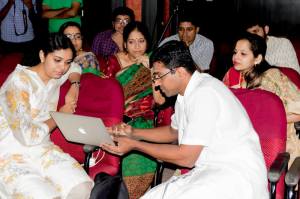
Palghat Ramprasad and Vanipriya Jayaraman (Founder, Zeekh app) demonstrating the Manipravaham feature
In fact, when practice sessions become excruciatingly hard, I think of the times I had to prepare for my qualifiers or my defence. If I could go through that ordeal, I tell myself that I should be able to do the same in a field I am passionate about. Apart from this, I do not see economics and music meet.
But yes, I used the Delaunay optimisation technique, which I also used in one of my publications (a paper on spatial econometrics), in an app feature called Manipravaham to help musicians come up with concert song lists while ensuring variety in ragam, talam, composers, language and so on.
How would you describe yourself as a teacher — are you a taskmaster? And as a musician? What kind of lessons do you draw from your legacy?
I am a tough taskmaster, so much so that sometimes my expectations may be too idealistic and impractical. I do not let my disciples compromise on the quality or quantity of their practice.
The same is true of my own practice. I do not compromise even a bit on my practice, be it the duration or the effort. I practise much longer and much harder than I ask my students to do, which is only fair. My practice sessions are excruciating for me but also really unpleasant for the people around. I have to thank my wife for putting up with several hours of my dry, boring and painstaking sessions, in which the same swaram or sangathi goes on for hours together every day. My kids ask me many times why I haven’t gone beyond one note after several hours of practice, and if I’m a bad singer! In those instances, it’s a question of truth versus my image as a dad with my daughters (laughs)!
Sometimes, when my students play the tambura while I practise, I see their restlessness after an hour or so since I’d be singing just one or two notes because I would not have gotten them right. So in that sense, I am fair — in that while I do pick on my students even for slight mistakes, I don’t spare myself either. If anything, I am several times harder on myself.
However, I communicate in detail my expectations from students and their families with regard to what they will learn from me and how, before taking them under my wing. Hence, there is no new nonsense, only the ones that they consciously signed up for!
And what are these expectations?
Learning from me is rigorous, it’s not like learning any other extracurricular activity as I look at music very differently. I’m very careful about whom I teach. One — I expect total commitment from everyone involved in the prospective student’s music, as it involves the student’s time, his/her family’s time as well as mine. I expect the student to practise at least one hour a day, all seven days of the week. No exceptions, including examinations or school tests.
Two — I only know songs that were handled by yesteryear artists — artists from the pre-70s era — Alathur Brothers, Ariyakudi, GNB, et al. These songs require more than 4–5 times the time and effort that are required for ‘normal’ songs that are sung today. The fallout is that, instead of possibly learning 20–25 songs a year from someone else, the student will learn only 8–9 or maybe even fewer from me. Keep in mind that I’m a tough teacher and do not compromise the slightest on quality — that may drag the learning time even further.
Three — I take students who are in it for the long run and not just with the pseudo-goal of doing an arangetram and getting into college using a few fringe performances as an enhancer to obtain college admission.
Next, for the first 1–2 years, I place restrictions on which artists the student can listen to, to enable smooth transition to my style of singing. In addition, I make it clear upfront that there will be no interference from those involved at the student’s end in choosing the songs he/she learns and the competitions he/she participates in, or in deciding when he/she is ready for the concert stage.
I insist that all my US-based students have several classes in person each year. Usually, I visit the US at least a couple of times each year so that isn’t a problem. If I don’t, then the student needs to visit me.
I care about input, as I believe that the output is not always in our control. So, if in the first few classes I feel that the student has not put in the necessary effort, regardless of the output, I may warn him/her once or twice at most and then stop teaching.
My classes are not long, unless students have impending concerts. So every minute needs to be productive. Which means I will not spare even a minute to go over something during the classes that should have been sorted out by the student during practice.
Some of this may not sound realistic or practical, but I let prospective students know all of this in advance so they are aware of what they are in for, rather than feel sorry afterwards!
How do your principles manifest in your classes and your own singing?
Some of my classes do not go beyond a sangathi, some stop with sa pa sa — if I realise that the student has not practised enough. There have been many crying sessions, but my retention rate of students is about 90-95% over the years (and the ones who have dropped out have done so because I initiated their move to a different teacher with whom I felt the relationship would be mutually beneficial). Also, I have not been able to take in any more students in the last year or so because of my schedule. So perhaps I am doing something right as a teacher!
As a musician, I have strived for my music to touch the souls of listeners rather than just give them a cerebral high. Even if I sing sa, if people are touched by it, they will remember it forever. That has been the hallmark of past artists like Ariyakudi, GNB, Alathur, Chembai, Semmangudi, KVN, MDR, etc. I would be blessed if I can remind rasikas of such artists through my music.
Coming as I do from a musically blessed family, I strongly believe in not making any compromises on or off stage. To me principles matter more than anything else. I have had my share of unpleasantness and non-acceptance because of my stance from various stakeholders in the fraternity, but I understand that is part of the package. Nothing will stop me from adhering to my value system.
What do you want to achieve as far as music is concerned?
Frankly, I do not have a goal in mind. I want to sing well; I believe in working really hard towards achieving that without any compromises. I do not want anything the easy way in music — I prefer struggling to get something so that I value it highly and am able to consider it a reward for my hard work, sincerity and integrity, and nothing else.
I want to enjoy my journey as much as possible and spread the ‘praacheena’ style of music through my disciples. At the same time, if I’m able to remind the listeners of past masters through my music, that would be gratifying. I am sure Thatha and Appa will be happy too if that happens.
Watch Palghat Ramprasad sing Bhajare Raghuveeram by Sadashiva Brahmendra for Madrasana:
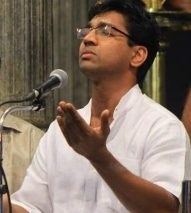
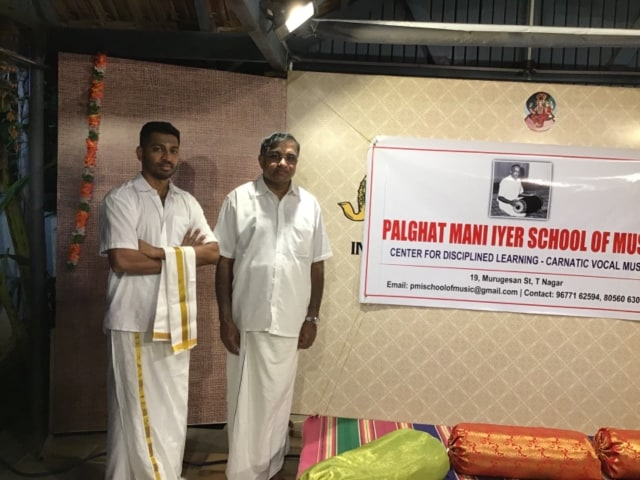
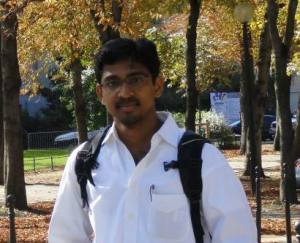
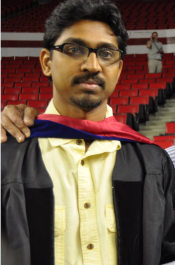
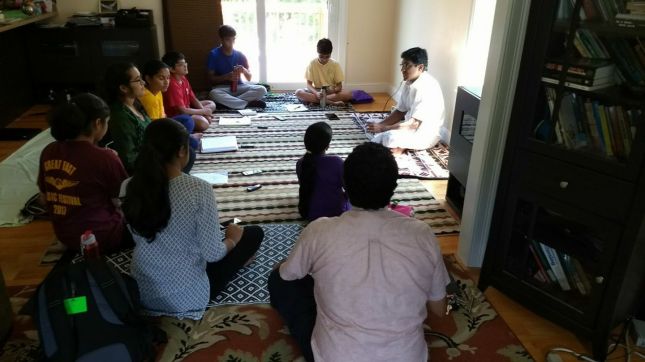
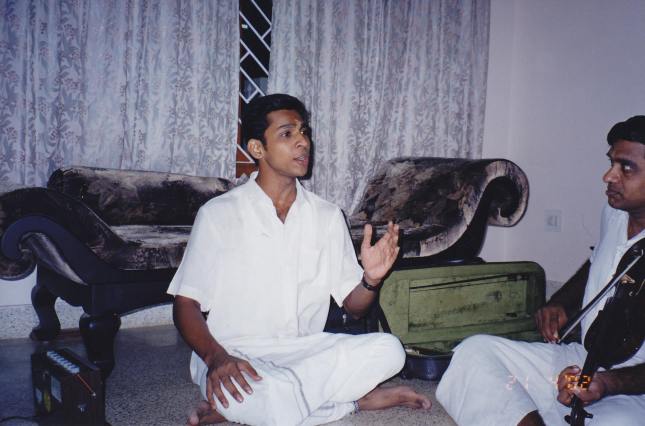
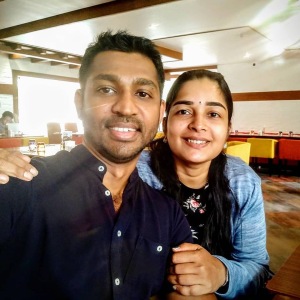
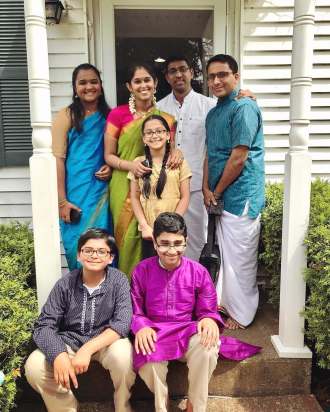
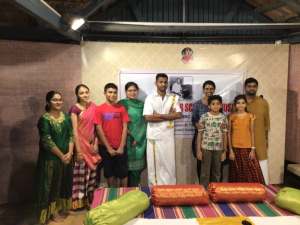
Nice for a nivedanam after a long pause, or did I miss out? Hope your baby is keeping you interestingly busy.
LikeLike
I’m certain you haven’t missed anything/much, sir, it has definitely been a long break. Baby — who is no longer a baby — keeping me on my toes!
LikeLiked by 1 person
Very nice interview ! Best wishes Ram !
LikeLike
Presenting a one of a kind artiste’s arduous musical journey is our unique young woman of many talents–I bet you make a great mother too, Nivedita! As always, admiration, affectionate greetings 🙂
LikeLike
Thank you, dear Arasi-ji, and pranaams to you.
LikeLike
Ramprasad Sir, you are doing great service, towards Karnatic music & our great Indian Culture. Keep it up. Am your Fan.
LikeLike
I was initially impressed by the amazing beauty and Vidwat ( of which I am not a judge) of Sri Ramprasad, I did google search. Knowing about his qualifications increased my admiration manifold. When I read that my most respected Sangeetha Kalanidhi Palght Mani Iyer is his grandfather…I felt so happy and connected..Finally when i finished reading this interview, it is immense respect and admiration and sense of pride…i salute his father who was hods teacher also.. Wish Sri Ramprasad continue his amazing journey of music and personal life with blessings of Almighty for many decades top come
LikeLike
Recently only I listened to his music with vittal rangan and pathri, I was spellbount, I request to popularise carnatic music in all over kerala with reduced rate, we can’t imagine maestros like you with rangan, pathri,varadarajan, sriram, etc petforming in our towns like kottayam, thodupuzha, etc
LikeLike
Late realisation of the greatness and practice of “neravel” at 77yrs made me think I could have made my daughter a better singer if only I had realised it earlier.your write-up fine- tuned my late realisation of the importance of Mirabel.
28/08/2023.
LikeLike